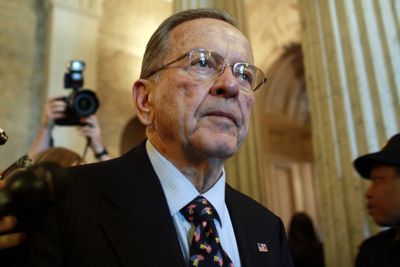U.S. dropping case against Stevens
Attorney general orders internal review

WASHINGTON – In a stunning reversal, the Justice Department on Wednesday moved to drop all charges against former Sen. Ted Stevens, saying his jury conviction for lying on financial disclosure forms to conceal gifts and home renovations was so riddled with impropriety it should be dismissed “in the interest of justice.”
Prosecutors had been adamantly fighting efforts by the Alaska Republican’s defense team to have his conviction thrown out. But Attorney Gen. Eric Holder disclosed in a statement he had personally decided to reverse course and, in effect, wipe away not only Stevens’ conviction but the underlying federal charges.
Stevens largely disappeared from public view following his conviction in late October, after which he was narrowly defeated for re-election. On Wednesday, he said Holder’s decision will allow him to get on with his life.
“I always knew that there would be a day when the cloud that surrounded me would be removed,” said Stevens, 85. “That day has finally come. It is unfortunate that an election was affected by proceedings now recognized as unfair.”
The high-profile case against Stevens, the longest-serving Republican in the Senate, had been criticized frequently by the presiding federal judge for missteps by prosecutors in the Justice Department’s Public Integrity section. Holder said he was reserving judgment on whether they committed any actual misconduct, but he has ordered a full internal review of the Justice Department’s handling of the case.
But in the meantime, Holder said he took such dramatic action in part due to prosecutors’ repeated failure to provide important and potentially exculpatory information to Stevens’ defense team. That included one incident that came to light in a court filing Wednesday that raised questions about the testimony of Bill Allen – Stevens’ contractor, former friend and the government’s key witness against him.
In the filing, Justice Department officials said they had they found one key piece of previously undisclosed evidence had been kept from the defense – portions of an April 15, 2008, interview between authorities and Allen, an Alaska oilman and former chairman of the now-defunct VECO company. Allen testified at trial he decided not to send Stevens a bill for all of his work after meeting with an intermediary for Stevens named Bob Persons. He said Persons left him with the unmistakable impression that he was not supposed to charge Stevens for the work on the senator’s Alaska chalet, even though the senator had sent him a note requesting a bill. Allen said he was told to ignore Stevens’ note because it was sent only to provide a false record to protect the senator.
But in its post-trial investigation, the new team of prosecutors discovered that although “no memorandum of interview or (FBI) agent notes” existed for the April 2008 interview with Allen, two prosecutors who were there did take notes. And those notes indicated Allen said he “did not recall talking to Bob Persons regarding giving a bill to the defendant,” according to the motion seeking the verdict be set aside.
Stevens’ chief defense lawyer, Brendan Sullivan Jr., was critical of the prosecutors, saying the attorneys and at least one FBI agent had engaged in a level of misconduct so “stunning,” it amounted to a case of government corruption.
The monthlong trial showed employees for VECO Corp. had transformed Stevens’ modest mountain cabin into a modern, two-story home with wraparound porches, sauna and wine cellar. Stevens said he had paid $160,000 for the work, believing that covered all the costs.
In October, a federal jury in Washington convicted Stevens on seven false statement charges, making him only the fifth sitting senator in U.S. history to be convicted of a felony. In December, he appealed his conviction.